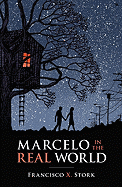All that to say: Here's another belated response to a book that's gotten lots of attention elsewhere.
 Marcelo in the Real World by Franciso X. Stork was on many reviewers' Best of 2009 lists and won the Schneider Family Book Award for 2010. Lots of people were disappointed it didn't win a Printz honor. Here's the publisher's description:
Marcelo in the Real World by Franciso X. Stork was on many reviewers' Best of 2009 lists and won the Schneider Family Book Award for 2010. Lots of people were disappointed it didn't win a Printz honor. Here's the publisher's description:Marcelo Sandoval hears music that nobody else can hear — part of an autism-like condition that no doctor has been able to identify. But his father has never fully believed in the music or Marcelo's differences, and he challenges Marcelo to work in the mailroom of his law firm for the summer . . . to join "the real world."
Reminiscent of The Curious Incident of the Dog in the Night-Time in the intensity and purity of its voice, this extraordinary novel challenges the boundaries of autism. It is a love story, a legal drama, and a celebration of the music each of us hears inside.Like so many others who have already written about this book, I liked it. I read most of it in one night -- that's a good sign right there. And I really liked Marcelo. One of the best characters I've encountered in a while. I felt protective enough of him quickly enough that when his father issues his ultimatum around page 20, I had trouble continuing. I didn't want Marcelo to be in any kind of peril. The other sympathetic characters worked for me, too. The minor characters in Vermont were especially strong.
Other things I liked:
- the pacing of the book, which is slow and studied, like Marcelo's thought processes.
- the fact that it deals with big issues, real moral dilemmas.
- its insights into how having a very different kind of brain -- a different way of being in the world -- might feel.
- observations that a naive narrator brings to the everyday world (Marcelo's use of the phrase "large talk" as the opposite of "small talk," for instance)
On balance, I found it a terrific book and recommend it. If there's anyone else out there who hasn't read it yet.